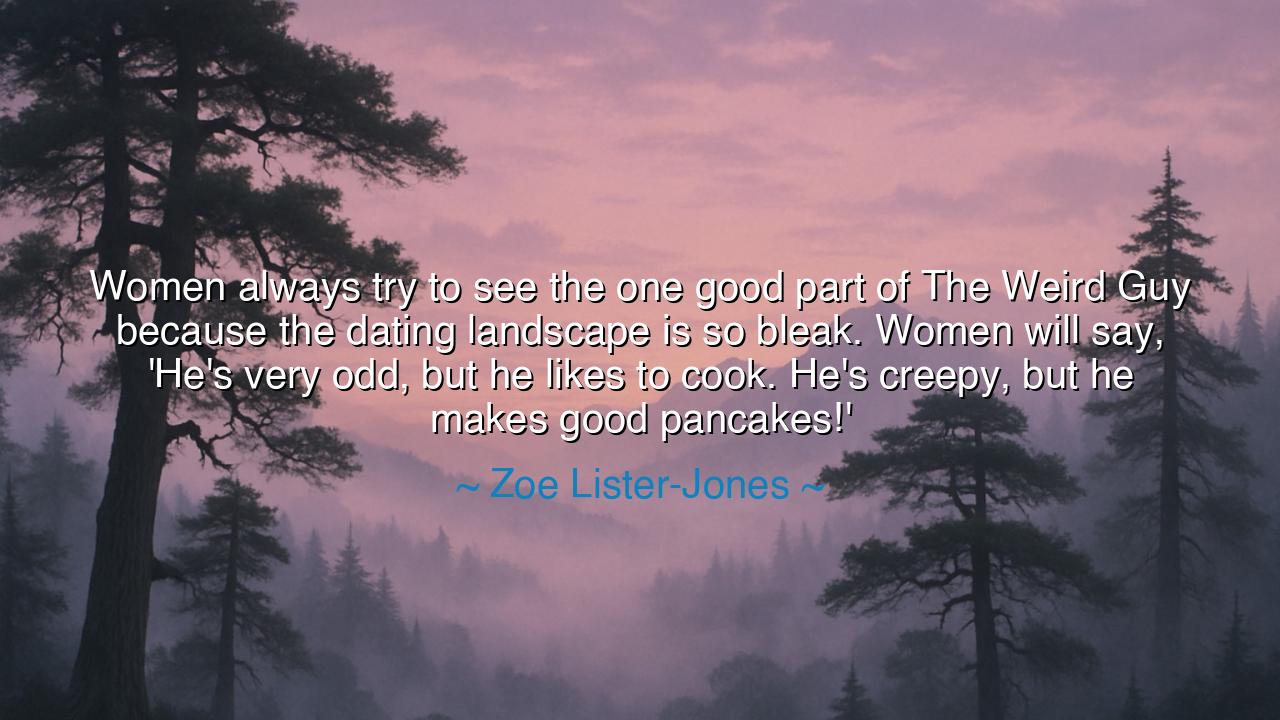
Women always try to see the one good part of The Weird Guy
Women always try to see the one good part of The Weird Guy because the dating landscape is so bleak. Women will say, 'He's very odd, but he likes to cook. He's creepy, but he makes good pancakes!'






In the words of Zoe Lister-Jones, we hear a truth both sharp and sorrowful: “Women always try to see the one good part of The Weird Guy because the dating landscape is so bleak. Women will say, ‘He’s very odd, but he likes to cook. He’s creepy, but he makes good pancakes!’” Though spoken in jest, her words echo with the weight of ancient wisdom — for beneath laughter lies lament, and beneath lament lies the story of yearning itself. She speaks not only of the world of romance, but of the human tendency to cling to fragments of light when surrounded by darkness.
The “Weird Guy” of her saying is not a single man, but a symbol — a figure born from loneliness and the scarcity of genuine connection. He is the emblem of a time when hearts are hungry, yet sincerity is rare. In this landscape, hope becomes selective vision; one sees what one wishes to see, and blinds oneself to what one fears. A woman says, “He’s odd, but he cooks,” because the act of nourishment feels like proof of tenderness, even when kindness may only dwell in that single gesture. Thus, Zoe’s humor unveils a tragic wisdom: that when the world grows barren, even the smallest bloom appears divine.
This is no new phenomenon. The ancients, too, knew the hunger that love can breed. In the Greek myths, Pygmalion, unable to find virtue in the women around him, sculpted a statue of perfection — Galatea — and loved her for the purity he could not find in flesh. He prayed to the gods until they granted her life. And yet, even in that fable, there is caution: what we create out of loneliness may never return the love we imagine. The heart, when starved, becomes the artist of illusion. Zoe’s words, though playful, warn us against this same enchantment — that in seeking good within “The Weird Guy,” we may be crafting statues where no soul resides.
But her saying also carries compassion. To see the “one good part” in another is not folly alone — it is also grace. It is the sign of a heart that refuses cynicism, of one who continues to believe in redemption and goodness even when disappointment has been her frequent guest. The woman who still hopes, even amid a “bleak landscape,” possesses a courage the ancients called philia — the love that endures, the flame that keeps burning though the night is long. She embodies the eternal wisdom that it is better to hope and ache than to harden and forget how to love.
Still, the warning must be heeded. Discernment is the companion of love, as hope is its child. To see the good in others is noble, but to mistake crumbs for a feast is perilous to the soul. There is a difference between mercy and self-deception. A woman who justifies a man’s oddness or creepiness with the sweetness of pancakes is like a traveler who mistakes a flickering lantern for dawn. Zoe Lister-Jones, in her dry wit, holds up a mirror not to mock women, but to awaken them — to remind them that love must be built on wholeness, not fragments.
History offers us lessons in this balance. Consider Eleanor of Aquitaine, queen of two kingdoms, who saw greatness in men yet refused to bow to their flaws. She loved fiercely but ruled wisely, and when her heart was betrayed, she did not dwell in illusion. She built courts of art and justice, choosing creation over despair. Her story stands as testament that compassion and power can dwell in the same heart — that one may see goodness in others without sacrificing one’s own worth.
The lesson, then, is both tender and resolute: see the light in others, but do not mistake it for the sun. Cherish kindness, but do not let it blind you to harm. Seek connection, but not at the price of self-respect. In the modern wilderness of love — where the sincere are few and the lonely are many — one must cultivate both hope and wisdom, like twin wings that keep the soul aloft.
So, my children of tomorrow, hear this teaching: Laugh, as Zoe did, but learn from the laughter. When you meet “The Weird Guy,” or anyone whose goodness shines faintly amid flaws, honor that light — but do not lose yourself in it. Know your worth, tend your spirit, and wait not for the one who merely cooks, but for the one who nourishes your heart. For in the end, the true banquet of love is not made of pancakes, but of truth, respect, and the sacred peace of being seen as whole.






AAdministratorAdministrator
Welcome, honored guests. Please leave a comment, we will respond soon